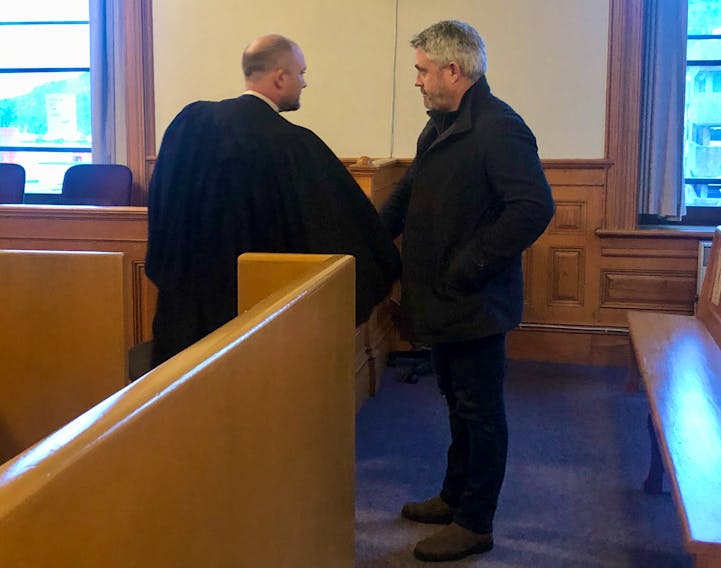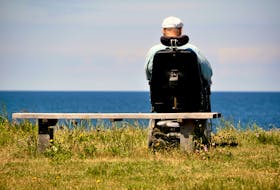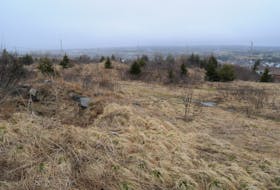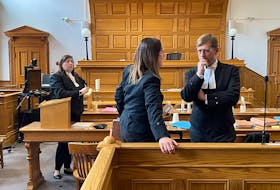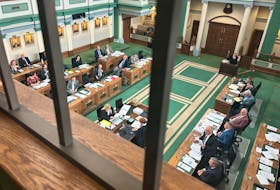ST. JOHN'S, N.L. — Having made a last-minute bid against an order to provide a sample of his DNA to a national police database, Kurt Churchill’s application was granted by the province’s Supreme Court Monday.
Justice Vikas Khaladkar issued a stay — a temporary stoppage — of an order given to Churchill by a provincial court judge almost two weeks ago, which had compelled Churchill to go to Royal Newfoundland Constabulary headquarters in St. John’s by Nov. 17 to provide a sample of his DNA.
“The most intimate information that a person can have is their genetic information. During that interim period (during an appeal), the information is still there and it’s allowed to be accessed.” — defence lawyer Robby Ash
Churchill had requested a stay of the order pending the outcome of his appeal of his finding of guilt on a charge of threatening police. His lawyer, Robby Ash, argued the DNA order was an invasion of privacy.
“The most intimate information that a person can have is their genetic information,” Ash said, pointing out once a person’s DNA is in the database police can access it, even if the person is later found not guilty. “During that interim period, the information is still there and it’s allowed to be accessed.”
In September, provincial court Judge David Orr found Churchill, 43, guilty of threatening an RNC officer who had picked him up on George Street for being drunk in public in March 2019. Const. Cody Dunphy had testified Churchill became belligerent and aggressive in the police vehicle, throwing insults and making vague threats before telling him, “I’m going to put my f---ing boot in your head.”
Churchill told the court at his sentencing hearing he had no recollection of the incident, but apologized if he had scared or intimidated any officers.
On Nov. 5, Orr granted Churchill a conditional discharge and 12 months’ probation, meaning he will have no criminal record if he successfully abides by certain conditions for the next year. If he doesn’t, his discharge can be revoked and replaced with a conviction. Orr also issued the DNA order, giving Churchill 10 days to report to RNC headquarters to provide the sample.
“Considering the nature of the offence — the accused was highly intoxicated in a public place and threatened a police officer and according to his own submission has no recollection of the events — in the absence of any evidence of impact the order would have on the accused’s privacy and security, it is an appropriate situation for the making of a DNA order,” Orr said.
In the province’s superior court Monday afternoon, Khaladkar stayed the order pending Churchill’s appeal outcome, ruling in agreement with Ash's submissions that the court had the jurisdiction to intervene in the matter and that providing the DNA sample would amount to an invasion of privacy that could not be reversed if Churchill is found not guilty on appeal.
Khaladkar cited comments from an Alberta judge in a previous case, saying while it was true a DNA sample could be removed from the database after a successful appeal, if the sample had been used and relied upon in the meantime, the damage would already have been done.
“By judicial order, the appellant will have been conscripted against himself,” Khaladkar quoted.
Ash had suggested, if Khaladkar didn’t see fit to stay the DNA order, that he make Churchill’s DNA sample inaccessible to police pending the appeal outcome.
“(Churchill) would suffer irreparable harm if the order is executed tomorrow,” Ash said.
He told the court he and his client were “prepared to put (their) foot on the gas” and proceed with the appeal as soon as possible.
Prosecutor Mike Murray had submitted the court did not have jurisdiction to order the stay, and told Khaladkar the trial judge had properly granted the DNA order.
Court documents indicate Churchill’s address is a Craigmillar Avenue home that has been the subject of a police homicide investigation, after 47-year-old James Cody was found shot on the street nearby last July. No arrests have yet been made, though the RNC says it has identified suspects and put “precautionary measures” in place to ensure the public isn’t at risk.
Sources say delays at national forensic labs, particularly related to firearms testing, have increased during the COVID-19 pandemic and are holding up the investigation. Last month, police went to court to get an extension on their seizure of items from the Craigmillar Avenue address, from where they reportedly took a CCTV system, bullet casings, multiple cellphones and other items. Investigators found a handgun on an adjacent property.
Tara Bradbury reports on the courts and the justice system in St. John's.

